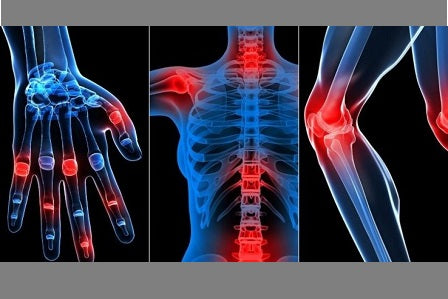Nourishment for Healthy Joint:
Nourishment for Healthy Joint: Arthritis affects people of all ages, with approximately 350 million people worldwide suffering from arthritis and being the leading cause of disability in developed countries. In Hong Kong, a recent survey show that nearly 90% of people aged between 30-64 experience some types of joint-related problems in the past year, with the majority suffering from back, knee and neck pain. Among them, more than 50% have been suffering for three years or more. In addition, approximately 40% believe that joint problems only happen to the elderly and 60% believe there is no cure for arthritis. As the Hong Kong population ages and their lifestyle changes, it is believed that more people are going to suffer from arthritis. Therefore, it is important to gain a proper understanding of this disease and the ways to keep joints healthy as a preventative approach.
What is Arthritis? What causes Arthritis?
Arthritis refers to a group of joint disorders that involves inflammation. The most common form is osteoarthritis. Symptoms of arthritis include pain and limited function of joints. Inflammation of the joints from arthritis is characterized by joint stiffness, swelling, redness, and warmth. Tenderness of the inflamed joint can also be present. Joint is where two or more bones meet and involves the cartilage and the joint fluid. Aging, exercises, repetitive use of the joint or obesity can wear down the cartilage, causing joint pain and inflammation. In advanced case, inflammation of the cartilage can stimulate the formation of spurs around the joints. In addition, aging or overuse of joints can accelerate the loss of joint fluid, which is important for reduction of friction between cartilage, shock absorption and nutrient transportation, resulting in the deterioration of the cartilage.

Medication for joint health:
Since arthritis is frequently accompanied by joint pain, the conventional treatment usually involves the use of painkillers. Acetaminophen and non-steroidal anti-inflammatory drugs (NSAIDSs), such as aspirin and ibuprofen, are commonly used to reduce pain and inflammation of joints. Others over-the-counter medications and topical pain-relieving agents (e.g. wintergreen oil) may also be used. However, all these drugs should be used with caution because some medications can interact with one another and certain health conditions might put you at increased risk of drug side effects.
A fatal case from the U.S. reported a 17-years-old female runner frequently treated with wintergreen oil to relieve muscle soreness due to frequent injuries. One night she died in her sleep and the cause of death is poisoning after investigation. Her blood is found to be containing six times more of wintergreen oil than the normal component. It is suggested not to use wintergreen oil without doctor’s consultation.
Nutrition supplement that nourish your joints:
Besides conventional medication, taking nutrition supplements is another way for tackling joint problems. Three of the most commonly found joint health supplements include fish oil, glucosamine and cetylated fatty acid.
Fish oil:
Fish oil is a rich dietary source of omega 3 fatty acids, which have anti-inflammatory effects. Although it provides fast-acting comfort, fish oil doesn’t delay the worsening of joint problem. Therefore, its function is similar to those of medications.
Glucosamine:
Glucosamine, which is usually derived from the shellfish shells, has been widely promoted as a treatment for joint pain, especially in the West. It is once thought to promote the formation and repair of cartilage.
However, a growing body of clinical evidences suggest that glucosamine is not likely to have any impact on joint pain or narrowing of joint space. In addition, glucosamine is not suitable for all people. Diabetics with joint concern should take glucosamine with caution. Cetylated fatty acid (CFA): Cetylated fatty acid (CFA) is a group of naturally occurring fats, which was first found in whales and also produced from other animals. Since whales are different from fish, the composition of CFA is different from that of fish oil. CFA can increase joint fluid, help lubricate joints and promote joint flexibility. It also enhances the restoration of cells around the joints. Clinical studies have shown CFA can improve range of motion and restore joint health with no side effects. Therefore, CFA provides not only speedy pain-relief but also cumulative benefits.

Health tips:
Exercise:
Keeping an active lifestyle is a proactive approach to maintain joint health. Contrary to popular belief, staying sedentary actually causes more problems because it can weaken the muscles and joints. On the other hand, adequate exercise can reduce pain, increase flexibility, improve joint mobility, strengthen the heart, improve blood flow, maintain weight, and promote general physical fitness. Walking, swimming, and water aerobics are some examples.
Weight control:
Overweight or obesity puts excess stress over the joint, accelerating the joint deterioration process. People who are overweight or obese should try to maintain a healthy weight because this can reduce stress on weight-bearing joints (e.g. knee, hip etc.), preventing further injury. Rest: Rest is important during joint pain, but excessive rest may result in stiffness of joints and weakened muscles. Therefore, having just the right amount of rest is key.
Maintain good body posture:
Sitting and standing up straight protect the joints from neck to knees and keep them healthier. Good posture also helps guard the hip joints and back muscles. When lifting heavy objects, remember to bend at the knees instead of the back. Such posture can prevent back injury.


